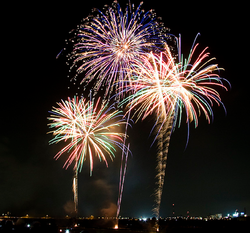
I am not, as you may have guessed, religious. But I do like a good celebration. And I don’t want to talk about religion, as such. I don’t think that religion is the reason our traditions and festivities are where they are.
I’ll start with the big one first. Yes, I am absolutely comfortable celebrating Christmas without believing that Christ was the son of God. Not just because I enjoy it – the lure of tradition is strong and that’s certainly a factor, I will admit to liking presents, booze and a new episode of Doctor Who – but also because Christmas is, like I say, where it is for a reason. It’s not original to note that there was a pagan celebration the Christians probably co-opted in order to get more people to join in, but it’s a point worth making anyway.
| Winter, even with central heating, lighting and jumpers, can be dark and miserable. I might know, logically, that the world isn’t going to end, that the long days of sunshine are going to come back eventually, but the part of my mind that starts to panic as soon as the nights draw in is comforted by ancient rituals of company, lights and merriment. We stave off the darkness for a little longer. | We create our own traditions. Sometimes on purpose, sometimes accidentally. |
As a child (ok, until embarrassingly recently), I was under the misapprehension that Guy Fawkes’ Night was a celebration of the attempt to blow up parliament. That all the fireworks were a reminder to the royals to be on their guard in case the revolution came. I have no idea where I got this idea, or what I thought the guys were all about, but it never stopped me enjoying the explosions in the sky, or even considering any acts of terrorism myself.
We create our own traditions. Sometimes on purpose, sometimes accidentally. One of the most enduring legacies of the plot to blow up parliament, other than the yearly bonfires and sparklers, is probably the job the Yeoman of the Guard have during the official opening ceremony of parliament each year – they search the cellars and the monarch isn’t allowed in until they have declared it safe. It’s not MI6 with their explosive detectors and gathered intelligence – they have a role to play, but the Yeomen of The Guard and their old-fashioned lanterns make the ritual.
In Brighton every year people make paper lanterns for an event called the Burning of the Clocks and then parade them down to the seafront and burn them to mark the shortest day and “usher in the new sun”. The event has been going on for 17 years but its links to the solstice, the day which is shortest every year, make it feel older.
I wasn’t allowed to celebrate Halloween as a child, because of its links to “devil worship”. And now every year I love to carve pumpkins and cook them, to dress up and generally revel in the silliness of it all. Samhain is important to people I know, and All Hallow’s Eve is also significant.
But why pretend that Halloween, as it is popularly celebrated in this country, is anything more than an excuse to dress up and eat sweets? And really, what’s wrong with that?
Let’s take some pleasure in each other’s company, make good food, even drink a little, and use our lights, lanterns, fires and explosions to keep the darkness at bay for another night.
Squeamish Louise


 RSS Feed
RSS Feed
